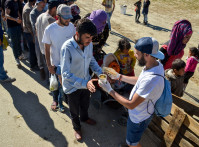The
2008 Failed States Index, released on Monday by the Fund for Peace and
Foreign Policy magazine, draws attention to the increasingly interconnected spheres of politics, environment, population, and security. The Index contains a number of widely anticipated inclusions, as well as a few surprises. Somalia, ranked third last year, is currently ranked first—a consequence of its weak transitional government, offshore pirates, and a refugee crisis that saw some 700,000 people flee Mogadishu last year alone.
But the news isn’t all bad. Among the bright spots in the Index:=- Liberia, still progressing on the path to stability after being last year’s most improved country, thanks to robust anti-corruption efforts and the resettlement of almost 100,000 refugees;
- The Ivory Coast, recently rocked by electoral discord, gaining stability as a result of a new peace agreement between between the rebels in the north of the country and the government-controlled south; and
- Haiti, despite recent protests against rising food prices, because of security improvements in Port-Au-Prince.
The Index also notes that these states share an interesting feature: All three host UN peacekeeping operations, suggesting to the authors that “though U.N. peacekeeping missions are frequently dismissed as underfunded, poorly staffed, and even corrupt, they should not be written off.”
Both Bangladesh and Pakistan stumbled in the rankings this year, as did Israel, which has been steadily losing ground in the Index for some time as a result of deteriorating conditions in the West Bank and marked economic disparities. Bangladesh saw a number of destabilizing events this year, including postponed elections, a divided government, protracted emergency rule, and the devastating November cyclone, which displaced some 1.5 million people and destroyed vast tracts of agricultural land. Similarly, neighboring Pakistan suffered under the imposition of martial law, with the assassination of Benazir Bhutto creating serious questions about the country’s future.
Natural resources, the Index makes clear, can be a double-edged sword for developing countries. They offer the potential for huge amounts of state revenue, but there is no guarantee that citizens will benefit. Whether that revenue is distributed equitably is a critical determinant of stability. The authors write that “oil continues to be more burden than boon to the world’s most vulnerable states,” as government regimes often use profit from natural resource extraction to finance militaries and suppress opposition rather than foster development. For instance, a former finance minister from Sudan claims that President Oman Hassan al-Bashir directs over two-thirds of Sudan’s oil revenue to defense spending. Record-high food prices and high levels of inflation also contribute to state weakness; combine these factors with unpredictable natural events, many of which have rocked the world in the past year, and, as the Index authors put it, “the cracks of vulnerability open wider.” A Publication of the Stimson Center.
A Publication of the Stimson Center.






